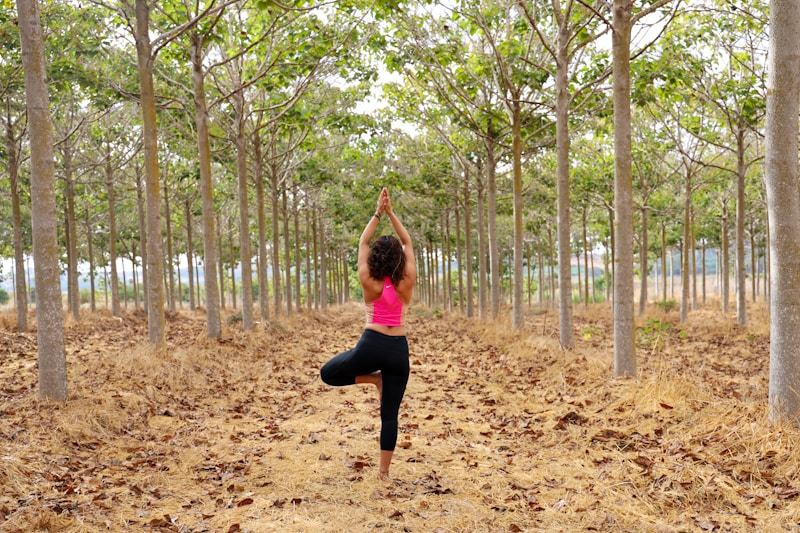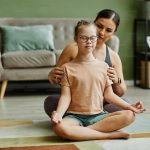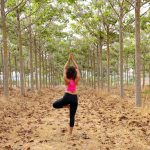Carrie Owerko is part yoga teacher, part bio-mechanics movement scientist, part performer, and part pure energy ball. Her beautiful practice and inspiring focus on play have attracted a loyal following across a wide range of yoga methodologies. She has just launched an online platform called The Playground which is a library of pre-recorded classes as well as access to live-streamed classes.
1. What was your first ever experience of yoga?
My first experience of yoga was a one-off lesson at college in Denver in the early 1980s. My modern dance teacher did some yoga, although at the time I had no idea what it was. I remember there was talk of chakras, we did some little sun sals and a couple of poses. What impressed me more than the yoga itself was that my teacher was really, really into it.
When I moved to New York in the late 80s/early 90s I sampled lots of different yoga classes. Then I took an Iyengar class, and I fell into that. I liked the precision and creativity at that time, but looking back I can see I was attracted to the teachers that were rebellious with the method even then.
2. Who are your greatest yoga inspirations?
Without a doubt, B. K. S. Iyengar. He was a fricking trailblazer; he lived, ate, breathed, and slept yoga, and it’s hard not to admire that. There’s no doubt that he was a genius, but also very, very human. Also my own teacher for a long time, Patricia Walden. I have great respect for her and she is devoted to her practice.
But as a person, Tao Porchon-Lynch is like ‘wow’. She’s inspired me on multiple levels. I met her once in NY after a class, and we were talking and she grabbed my arm and said, ‘This person told me I couldn’t do that, that person told me I couldn’t do another, but they’re all dead now!’
Also Richard Freeman and his partner Mary Taylor. I spent a week with them when I was going through a difficult time and they were just extraordinarily kind. The teachers that really inspire me are the ones I want to grow into – they teach me to be a better human, not a better acrobat.
3. What qualities do you think makes a good yoga teacher?
My bias is towards play! Also, somebody who has kindness, compassion, and humour. Plus, I think the role of the teacher is to help the students and themselves to be at ease with ourselves. I think that’s huge.
The truth is that people are different – I don’t like cookie-cutter teaching. Different students will react to different teachers and there’s going to be a student that responds to your honest exploration – if you’re doing it with integrity.
As yoga teachers we do our best to serve, there’s no right way to do it and there’s certainly not one way to do it.
4. What, for you, is the most challenging aspect of yoga?
The most challenging aspect of yoga is meeting myself as I am in the practice. I have to be OK with what I’m encountering. We try to control ourselves and our lives, but we are dealing with all aspects of ourselves, including the primal, autonomic animal side that kept us alive as cave people. And there are times when I haven’t been OK with the animal that I am.
5. How often do you practice?
From day one I have practised every single day, NO MATTER WHAT. It doesn’t mean the practice always looks the same – if I’m sick I have to adapt it. But I just do it, without expectations, because from that discipline comes creativity. For me, my practice is like my cat, I feed her, stroke her, look after her every day. My yoga practice is the same, I attend to it because it’s a loving act towards myself.
If you show up every day then that’s it, mission accomplished. It doesn’t have to be anything more than that. “I’m having a hard time today.” And that’s fine.
6. Is it important to try different types of yoga?
Personally I love a multi-disciplinary approach, through a variety of different movement methods, not just different methodologies of yoga.
Life itself is unpredictable and if we’ve been in this one, quiet room, with one way of moving, that’s not going to translate to being out in the chaos of the noisy streets. If you’ve practised with variability and deliberately challenged your balance, for example, moving your head around while balancing, your nervous system will be more prepared for the unpredictability of life.
7. How can a regular yoga practice help with daily life?
First of all, I don’t really differentiate any movement from yoga. Yoga is paying attention to your senses, your breath, being aware of your body, your face – yoga is an awareness practice that translates to anything and everything you do.
Yoga helps us to control our physiological response to stress. For example, part of my practice is to try to regulate the breath after deliberately putting my body through a stressful situation. Then I see how efficiently and effectively I can recover in as short a time as possible. This ability to shift gears helps with those everyday adrenaline surges from a stressful zoom class (for example).
Having a varied practice and trying small doses of a new thing also helps us to handle novelty and change, which is the one thing you can guarantee in life. It teaches us to be resilient.
8. How has the Coronavirus pandemic impacted your teaching?
When COVID-19 hit, I was in Australia in the middle of a workshop tour. When it became clear that I had to cancel the tour I then flew to LA and spent the night in an airport hotel and the next day I flew to New York and there were four of us on the entire jet – it was surreal.
When I got back I did a few Zoom classes, because like every other yoga teacher all my classes had just been canceled. Then we decided to expedite the launch of my new on-going, ever-expanding platform – The Playground.
9. How do you think the yoga world has reacted to the Coronavirus?
When the lockdown started there was a real sense of urgency in the yoga world and there was this mad dash to start teaching online, and to begin with all the online classes were free, which concerned me. We need to have a long-term vision of how this is going to be and make sure that we value the time and commitment we put into teaching. People are actually willing to pay, and it encourages them to make a commitment to yoga.
I would also hate to see the small studios suffer – some of my friends are studio owners and it’s their life, they work 24/7 to make ends meet… We need exchanges with other humans for our health, we knew it before, but now we know it in the visceral sense.
10. What to you are the pros and cons of teaching yoga online?
I like teaching online and I’ve done it for a while. My newly launched platform is great because it means there’s a place where all my students can access all my playful practices and educational resources. Because I teach all over the world (or I have been up to now anyway) there’s a support for students between annual trips.
However, I miss the interaction with people, so I never saw it as a complete substitute for teaching in-person, but as a supplement to.
I’ve also had my share of stressful zoom encounters. On one class we somehow lost every single registration and then had to manually re-enter all the data. It ended up being ok, but it was like literally down to the wire. There is this stress around it, but luckily my husband’s around more so he can come to my aid!
When I’m teaching live online there’s a different energy to it than the pre-recorded classes. When it’s live there’s no shouting ‘Cut!’ if something goes wrong, you just have to make it work – because things go wrong, things will not go as you planned, and you have to improvise just as you would in an in-person class.
11. What’s important to you about in-person teaching?
The in-person thing is also important and I’m still doing that, or I plan to anyway! I’m a person who learns best in different ways, so I take in information via audio, visually, through my body, and through play. I have to come at things from multiple angles for me to feel like I really understand it, and I like to facilitate that type of learning process too.
It’s like the difference between going to watch a movie and going to see a play. When you teach in a physical class, there’s this spontaneous interaction. It’s facilitated by the teacher, but it’s a magical space where human beings can engage in a non-repeatable event.
The in-person experience is significant and it won’t be going away – it might change, it might be different, but if history’s taught us anything it’s that humans will gather.
12. What would you like your yoga legacy to be?
I would like my legacy to be that play is important for adults.
Play can be a huge support in our learning process, it can bring joy to our lives and our practice, it can add an element of fun, and fun is often something that is underrated. I think it does really matter!
Yoga is seen as a serious subject, but I think play is divine. We’ve been playing forever – through sport, theatre, narrative, imagination – and we exercise our capacity for creative thinking via play. Play and creativity are our divine nature and if we want to connect to that then I think it can be a wonderful means to move towards the mysterious.
13. What would you like to say about the current coronavirus pandemic?
This current crisis has challenged every person across the globe. We’re living in a unique time and as a global population we’re experiencing a type of global stress. In the U.S. there are some things that are happening right now that are really sad, such as the murder of George Floyd and the subsequent riots. Humans are very taxed right now, and I feel we need to dig a little deeper and ask ourselves those important questions about what we really value, and how we treat each other.
We also need to remember we’re going through a lot! And to have a huge amount of compassion towards ourselves and each other, and how might we come through this experience with something of value.
There’s an opportunity here to make our world a better place. Yes – it sucks! But yoga helps us to reframe things to see that there’s an opportunity in adversity.
Carrie is kindly offering YogaLondon Blog readers a 10% discount for membership to her new venture, The Playground. The code for one-time usage for 10% off any of the 3 subscriptions is PLAYFUL10.












